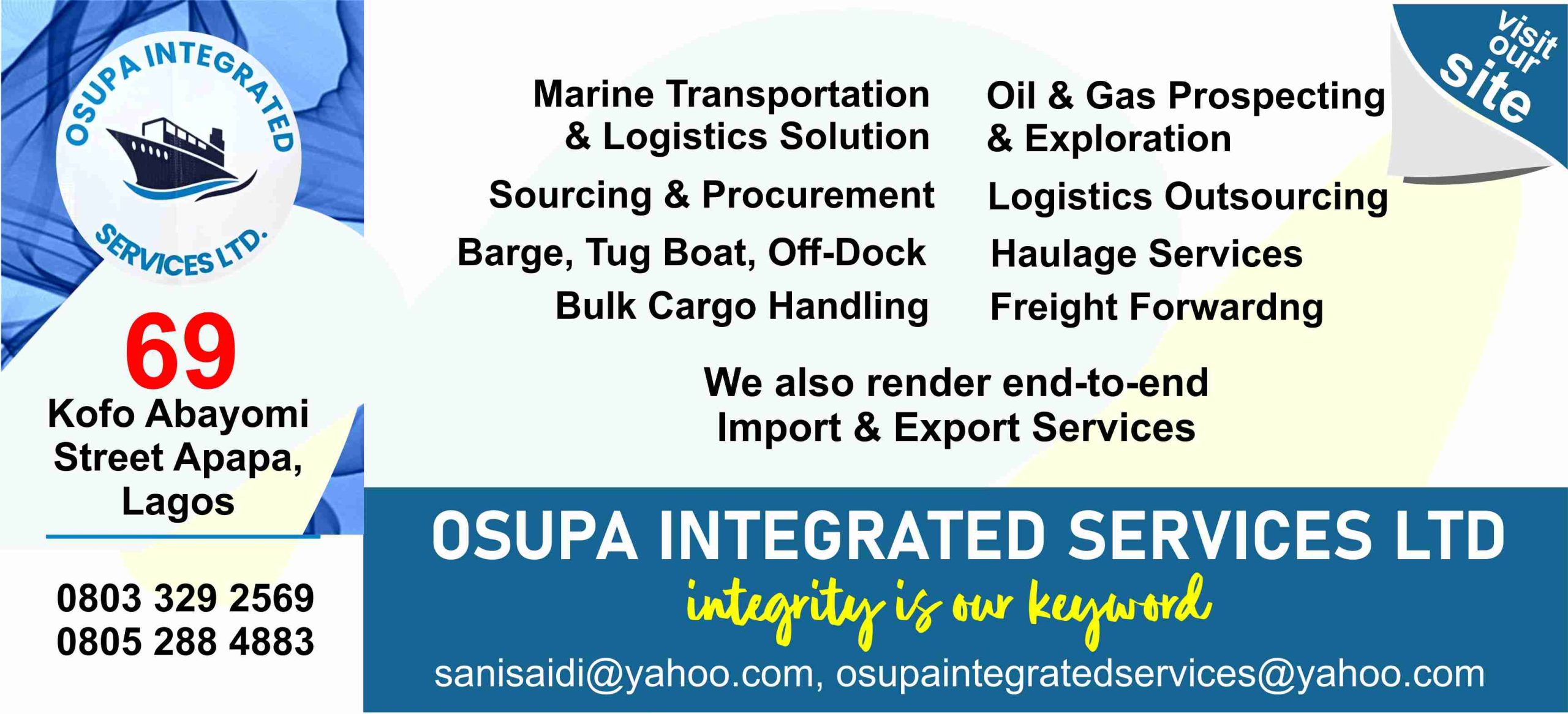After 64 Years of Independence, Nigeria Fails to Become a Maritime Powerhouse

L-R: Minister of Marine and Blue Economy, Adegboyega Oyetola and his heads of various maritime agencies; Dr Dayo Mobereola DG NIMASA, Dr Abubakar Dantsoho MD NPA, Barr Pius Ukeyima Akutah, Executive Secretary, Shippers Council and Bola Oyebamiji MD NIWA
By DAPO OLAWUNI
As Nigeria marks its 64th Independence anniversary, the nation’s maritime sector stands at a crossroads. Industry experts are raising concerns about persistent leadership gaps, the decline of ship ownership, and inefficiencies in port operations. Yet, amid these challenges, there is cautious optimism about the future, particularly with the recent establishment of the Ministry of Marine and Blue Economy. Through their insights, experts offer both a sobering assessment of the state of the industry and a roadmap for improvement.
Leadership Gaps and Lack of Vision
Dr. Edmund Chilaka, a maritime expert and Lecturer, in a chat with DAILY TREND, painted a grim picture of the industry’s current state. “Nigeria has not fared well at all in the maritime industry because of leadership lacuna and lack of motivation for operators,” he says. According to Chilaka, the operators are uninspired and poorly capitalized, unable to make the investments necessary to propel the industry forward.
Chilaka further criticizes the political appointments at the top of the sector, accusing them of being more interested in attending conferences and making speeches than solving real issues. “Appointees make speeches and take undue interest in attending endless conferences and seminars, repeating clichés and platitudes—a lot of motion, and no movement,” he notes. This stagnation, he argues, has stifled opportunities for growth, especially for indigenous maritime operators.
One glaring example, according to Chilaka, is the failure to amend the NIMASA Act of 2007, which could empower indigenous carriers by giving them access to cargoes free from international competition. “Such a clear low-hanging fruit has not been well processed by the political appointees,” he laments. He warns that the maritime sector is “adrift because of no good master at the helm” and urges the Ministry of Marine and Blue Economy and NIMASA to review their tactics and rediscover the objectives that would lead to meaningful growth.
Decline in Nigerian Ship Ownership
Otunba Shola Adewunmi, President of the Shipowners Association of Nigeria (NISA), shares a similar concern with DAILY TREND.
He points to the steady decline of ship ownership in Nigeria over the last 10-15 years, blaming successive governments for failing to recognize the strategic importance of maintaining a national fleet.
“There is no doubt that ship ownership in Nigeria has been on a steady decline over the last 10-15 years,” Adewunmi says. “Successive governments have not fully recognized the strategic importance of a national fleet, which has led to our waters being dominated by foreign vessels.”
However, Adewunmi remains cautiously optimistic about the recent creation of the Ministry of Marine and Blue Economy. He believes that if the ministry is managed by competent professionals with a clear mandate, it could address the longstanding challenges in the sector. “We are optimistic about the recent establishment of a Ministry of Marine and Blue Economy. If managed properly, this initiative could create an enabling environment for local shipowners to thrive.”
The Role of Port Efficiency in Economic Growth
Dr. Babalola Olatunde, a representative of the Shipping Trade Practitioners Association of Nigeria (STPAON), sees the creation of the Ministry of Marine and Blue Economy as a positive step but warns that its effectiveness is yet to be proven. “It is commendable, but the modus operandi is yet to be effective or efficient,” Olatunde told our correspondent, citing the confusion caused by the Standard Operating Procedures (SOP) created through the Port Process Manual (PPM).
Olatunde stresses the importance of addressing infrastructure deficiencies in Nigerian ports, particularly the need for functional tugboats, pilot cutters, and better welfare for marine pilots. He urges the ministry to engage with critical stakeholders to develop a comprehensive blueprint that focuses not only on revenue generation but also on providing affordable services to port users.
“The shipping industry, if properly harnessed, will provide needed jobs and foreign exchange for the country beyond oil and gas,” he explains. Olatunde calls for a more direct engagement between the ministry and key stakeholders to ensure that policies are grounded in reality. “The minister needs to meet with critical stakeholders to enable him to have firsthand information that would help produce sustainable policies for the ministry.”
Addressing Revenue Leakages and Corruption
Dr. Eugene Nweke, Head of Research at Sea Empowerment Research Center, stresses the importance of transparency in port operations and revenue collection. He warns that unofficial payments and corruption are rampant in the sector, leading to underreporting of revenue. “The possibility of funds ending up in personal pockets, as you mentioned, is a concern,” Nweke says.
He urges the ministry to strengthen oversight and transparency through regular audits and financial reporting, promoting a culture of integrity within maritime agencies. Nweke also calls for an independent study of port operations to ensure that the ministry can integrate effectively into the blue economy concept.
“By taking these steps, it’s possible to reduce underdeclaration of revenue and ensure that these agencies contribute accurately to the government’s coffers,” Nweke concludes.
Conclusion: A Path Forward
As Nigeria celebrates its 64th year of independence, the maritime sector faces numerous challenges, from leadership deficits to infrastructure gaps and revenue leakages. However, with the creation of the Ministry of Marine and Blue Economy, there is hope for a turnaround.
Experts like Chilaka, Adewunmi, Olatunde, and Nweke emphasize that for the sector to thrive, there must be a renewed focus on indigenous capacity building, efficient port operations, and transparent revenue management. Only then can Nigeria reclaim its position as a maritime powerhouse, contributing significantly to both the national economy and the global shipping industry.







